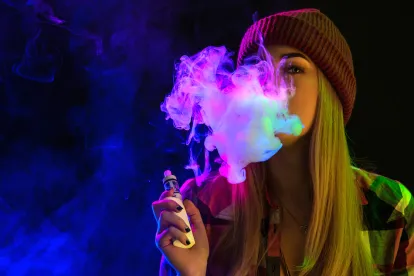While various states and municipalities grapple with how to address the proliferation of e-cigarette or vaping product use associated lung injury (EVALI) and the related uptick in e-cigarette use among young people, Massachusetts has taken a drastic measure to protect its residents. On September 24, 2019, Massachusetts became the first state to ban the sale of all vaping products after Governor Charlie Barker issued an emergency order that took effect immediately and would remain in effect for four months. The Order states:
“The sale or display of all vaping products to consumers in retail establishments, online and through any other means, including all non-flavored and flavored vaping products, including mint and menthol, including tetrahydrocannabinol (THC) and any other cannabinoid, is prohibited in the Commonwealth.”
The vaping industry viewed this temporary ban as unnecessarily broad given its application to nicotine vaping products, which the vaping industry maintains is not linked to the rise of EVALI. Since businesses were prohibited from selling vaping products for four months, the vaping industry also viewed this temporary ban as a threat to its very existence.
As a result, on October 4, 2019, the Vaping Technology Association (VTA) along with a vaping company and its owner challenged the governor’s emergency order and asked the Suffolk County Superior Court to grant a preliminary injunction. After a hearing, the Court issued its ruling on whether the plaintiffs had “[proven] a likelihood of success on the merits of the case and a balance of harm in their favor when considered in light of its likelihood of success.”
Separation of Governmental Powers
The Court first considered whether the emergency order violated article 30 of the Declaration of Rights of the Massachusetts Constitution, which mandates that “the executive shall never exercise the legislative and judicial powers.” The defendants argued that Massachusetts legislation permits the governor, after an emergency declaration is made, to “take such action and incur such liabilities as he may deem necessary to assure the maintenance of public health and prevention of disease.” However, in its ruling the Court explained that this does not give the defendants the authority to promulgate regulations without consideration of fiscal or small-business impact as well as public commentary.
Arbitrary and Capricious
The Court also found another defect in the ban: “the process and substance of the decision-making likely was arbitrary and capricious.”
“[T]he process by which the information was ‘gathered, identified, and applied to the statutory standards’ was arbitrary and capricious.” The defendants “ignored statutory criteria” such as the fiscal and small-business impact statements, “included a declaration of emergency based in part on a non-emergency (ongoing youth vaping epidemic), and failed to provide numerous mandatory safeguards.” Additionally, the defendants failed to consider commentary from “the public and affected persons and entities.”
Balance of Harms
In reaching its decision, the Court also considered the balance of harm to the plaintiffs and defendants. The Court acknowledged that the plaintiffs would suffer harm from having to shut down their businesses for months, which was “indeed likely to threaten the existence of the plaintiffs’ businesses.” Conversely, the Court noted “there is serious potential harm to individuals and the public if it does turn out that lawful nicotine-vaping is a factor in causing the current outbreak.”
Ultimately, the Court ruled in favor of Governor Baker and the Commonwealth: “[Although] the plaintiffs have shown a likelihood of success, the balance of harms weigh in defendants’ favor in some respect, and an immediate injunction against the entire Order would contravene the public interest.” Instead of enjoining the ban, the Court gave the defendants one week to cure the identified defects.
Subsequent Ban
In an effort to address the deficiencies in the original ban, Governor Baker introduced a new temporary ban on October 28, 2019. The VTA plaintiffs panned the new ban as “purely perfunctory, a mockery of the deliberative process that [the] Court instructed the Commonwealth to undertake,” and filed an emergency motion requesting that the Court order the defendants to show cause why they have failed to comply with the Court’s prior order and why the most recent ban is not enjoined under the Court’s prior order.
On October 30, 2019, the Suffolk County Superior Court denied the emergency motion, noting, among other things, that the revised ban was limited in duration (three months) and that the Commonwealth still has time to correct problems with the ban, including its failure to account for its impact on small businesses. However, the Court also noted, “There is no question that the evidence increasingly favors the Plaintiffs’ position that the current epidemic is caused by something other than lawful nicotine vaping products (especially non-flavored products).”
Uncomfortable with certain portions of the Superior Court’s Order that allowed the ban to go forward, Governor Baker and the Commonwealth have appealed to Massachusetts’s highest court. Arguments are scheduled for December over the nation’s most aggressive response to the rash of illnesses that have sickened nearly 1,900 and killed 37 nationwide.



 />i
/>i
